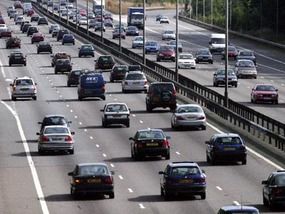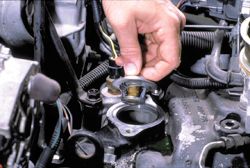 The thermostat is part of your cooling system. The thermostats in your vehicle perform a similar function to the thermostats in your home. At home, you set your thermostat to maintain a comfortable temperature range. Then when your home gets too hot, the air conditioning kicks on or when it gets too cool, the heater turns on.
The thermostat is part of your cooling system. The thermostats in your vehicle perform a similar function to the thermostats in your home. At home, you set your thermostat to maintain a comfortable temperature range. Then when your home gets too hot, the air conditioning kicks on or when it gets too cool, the heater turns on.
So your engine also has an optimal temperature range: warm enough to run efficiently and not so hot as to cause engine damage. Your vehicle’s thermostat is a valve between the engine and the radiator. When Denver residents first start a cold engine, the valve (thermostat) is closed, allowing the coolant surrounding the engine to warm up to the proper operating temperature. As the coolant gets hotter, the thermostat opens, allowing coolant to flow through to the radiator to be cooled. The thermostat opens and closes to keep the engine within a certain temperature range.
Now thermostats are rated for a specific temperature depending on the engine – not a one size fits all proposition. Thermostats are subject to normal wear. Proper operation depends on a special wax that expands as it heats up to open a spring-loaded valve. A worn thermostat could stick in the open position causing the engine to run too cool. This is inefficient and could affect performance and fuel economy. If a thermostat sticks in the closed position, the engine can be subject to the results of overheating.
There isn’t a specific routine for drivers to maintain their thermostat, but maintaining the cooling system by changing the coolant/antifreeze on a regular schedule will make sure the coolant has enough corrosion inhibitors to protect the thermostat and other system components. Cooling system experts and the team at Express Car Care in Denver recommend replacing your thermostats when you do a coolant flush or exchange. Also, thermostats usually wear out faster than your hoses, so if a worn hose replacement is performed, replace the thermostat at the same time.
If your temperature warning light comes on, have an inspection of your cooling system right away. This could be a thermostat. The thermostat could also be the culprit for Denver residents who aren’t getting hot air when they turn on their heater.
The thermostat is a relatively inexpensive part that stands guard between you and catastrophic engine damage. Follow your owner’s manual instructions or check with your friendly and knowledgeable Express Car Care service adviser to see if it’s time for a cooling system inspection or service.

 The thermostat on your vehicle is an important part of your cooling system. Your thermostat performs a similar function to the thermostat in your home. At home, you set your thermostat to maintain a comfortable temperature range. When your home gets too hot, the air conditioning kicks on and when it gets too cool, then the heater.
The thermostat on your vehicle is an important part of your cooling system. Your thermostat performs a similar function to the thermostat in your home. At home, you set your thermostat to maintain a comfortable temperature range. When your home gets too hot, the air conditioning kicks on and when it gets too cool, then the heater.